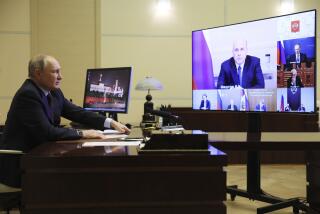Soviets Ready for Moratorium on Atomic Tests : Call Halt for Aug. 6 but May Cancel if U.S. Fails to Follow Suit
- Share via
WASHINGTON — The Soviet Union on Wednesday announced a moratorium on nuclear weapons testing to take effect Aug. 6, the 40th anniversary of the atomic bombing of Hiroshima, but the private statement delivered to a U.S. arms control lobbying group suggested that the ban will be canceled unless the United States follows suit.
The government news agency Tass said Moscow agreed to the moratorium at the urging of the Washington-based Center for Defense Information. The announcement was made two days after Soviet Ambassador Anatoly F. Dobrynin personally delivered a reply to the center.
Wording ‘Troublesome’
Retired Rear Adm. Eugene J. Carroll, deputy director of the center, said the wording of the Soviet statement was “troublesome” because it leaves open the question of whether the moratorium is unilateral or dependent on the United States taking similar action.
The Tass version seemed to indicate that the Soviets would stop testing regardless of U.S. action, but the message delivered to the center said the moratorium “could” take effect, “given the acceptance of other nuclear powers.”
Seems Part of Appeal
The initiative, whatever it ultimately means, seems to be part of an effort by new Soviet leader Mikhail S. Gorbachev to appeal to anti-nuclear activists in the United States and Western Europe.
Earlier this month, Gorbachev announced a moratorium on deployment of intermediate-range SS-20 nuclear missiles and proposed that the United States stop placing intermediate-range nuclear weapons in Western Europe. President Reagan rebuffed the suggestion, saying it would lock in place a huge imbalance in favor of the Soviets.
The privately financed Center for Defense Information, which describes itself as an organization that “supports a strong defense but opposes excessive expenditures for weapons and policies that increase the danger of nuclear war,” proposed a worldwide nuclear test ban last year in a letter to Reagan.
John T. Chain Jr., chief of the State Department’s Bureau of Politico-Military Affairs, rejected the suggestion in a letter dated Dec. 31, which he said was written “on behalf of the President.”
‘Long-Term Objective’
Chain said the United States favors a total test ban treaty as a “long-term objective,” but it doubts that such a pact could be verified. He said that, in the absence of a totally reliable treaty, the United States believes that “nuclear testing plays an important role in ensuring a credible U.S. deterrent.”
Shortly after it received Chain’s reply, the center turned to Moscow, proposing a moratorium in a letter dated Jan. 18 to Konstantin U. Chernenko, who then was the Soviet Union’s top leader but who died March 10 and was replaced by Gorbachev. The Soviets ignored the plea until this week.
Carroll said Dobrynin appeared at the center’s Capitol Hill office Monday with the text of an undated and unsigned telegram in Russian replying to the moratorium proposal.
1963 Test Ban Treaty
The United States and the Soviet Union agreed in 1963 to prohibit nuclear tests in the atmosphere and under water, but underground tests were allowed. According to the center, 925 underground tests have been conducted by the two powers since 1963.
The center did not give the source of its information about the number of tests. In recent years, the Energy Department has provided the only reliable data on tests, excluding small explosions that cannot be picked up on seismographs.
The United States announces its own large tests but not smaller ones. The Soviets do not announce any of their tests, although the United States calls attention to large ones.
According to the department’s figures, 17 Soviet and 12 U.S. tests were conducted last year. In 1983, the Soviets conducted nine tests and the Americans 14.
More to Read
Sign up for Essential California
The most important California stories and recommendations in your inbox every morning.
You may occasionally receive promotional content from the Los Angeles Times.













